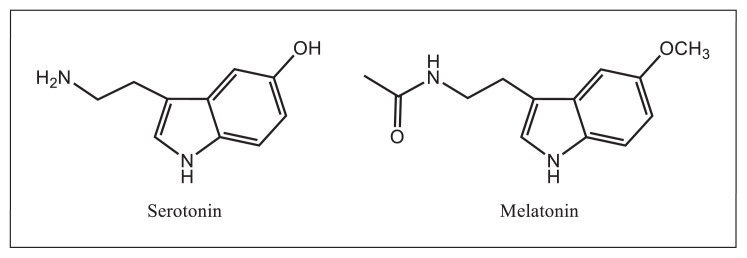Melatonin regulates the body’s sleep cycle
Melatonin is the primary regulatory hormone of circadian rhythm and plays an important role in initiating and maintaining sleep. It is synthesized from serotonin (Figure 1) and secreted by the pineal gland. Levels peak around 2 am at concentrations 10 to 100 times daytime levels. Melatonin levels are regulated by exposure to light.
Figure 1:
Structures of serotonin and melatonin.
Melatonin is effective against jet lag
A Cochrane review examined randomized trials in which travellers took placebo or melatonin (0.5–5 mg) at the destination bedtime after crossing five or more time zones.1 Of 10 trials, 8 showed significant reductions in the jet lag score (a visual analog scale from 0 to 100); a score of 60 or higher was present in 67% of controls but in only 17% of melatonin recipients (number needed to treat = 2). The benefit was greater when flying eastward and when crossing more time zones. Recommendations are available for using melatonin to treat jet lag.2
Melatonin may improve sleep
A meta-analysis of 17 placebo-controlled trials (n = 284) showed that melatonin increased total sleep time by 12.8 minutes, increased sleep efficiency by 2.2% and decreased sleep latency by 4.0 minutes. 3 Maximum effects were found to occur at about 0.3 mg, a dose that approximates physiologic levels of melatonin. However, the clinical significance of these changes is unclear, and disagreement exists regarding the use of melatonin for insomnia.4,5
Melatonin is not a dietary supplement
Sometimes incorrectly characterized as “herbal,” melatonin is synthetic. Unlike vitamins and other supplements, it is not a normal part of the human diet. It is the only human hormone available in Canada without a prescription.
Short-term use appears safe
No serious adverse effects have been reported with melatonin use for up to three months,3 although its long-term safety is not established. Melatonin should be used with caution in patients with epilepsy, and in those taking warfarin given reports of possible interactions.1
CMAJ invites submissions to “Five things to know about …” Submit manuscripts online at http://mc.manuscriptcentral.com/cmaj
Footnotes
Competing interests: None declared.
This article has been peer reviewed.
References
- 1.Herxheimer A, Petrie KJ. Melatonin for the prevention and treatment of jet lag. Cochrane Database Syst Rev 2002; (2):CD001520. [DOI] [PubMed] [Google Scholar]
- 2.Sack RL. Jet lag. N Engl J Med 2010;362:440–7 [DOI] [PubMed] [Google Scholar]
- 3.Brzezinski A, Vangel MG, Wurtman RJ, et al. Effects of exogenous melatonin on sleep: a meta-analysis. Sleep Med Rev 2005;9:41–50 [DOI] [PubMed] [Google Scholar]
- 4.Buscemi N, Vandermeer B, Friesen C, et al. Manifestations and management of chronic insomnia in adults. Rockville (MD): Agency for Healthcare Research and Quality; 2005 [DOI] [PMC free article] [PubMed] [Google Scholar]
- 5.Schutte-Rodin S, Broch L, Buysse D, et al. Clinical guideline for the evaluation and management of chronic insomnia in adults. J Clin Sleep Med 2008; 4: 487–504 [PMC free article] [PubMed] [Google Scholar]



